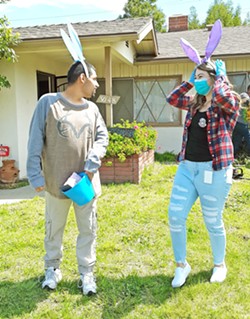Services and options change for people with disabilities and mental illnesses amid COVID-19
By Kasey Bubnash[
{
"name": "Promo Temp Targeted",
"id": "PromoTempTargeted",
"class": "inlineCenter",
"insertPoint": "4",
"component": "15511697",
"requiredCountToDisplay": "0"
},
{
"name": "Ad - Medium Rectangle CC01 - 300x250 - Inline Content",
"class": "inlineCenter",
"insertPoint": "8",
"component": "15582119",
"requiredCountToDisplay": "12"
},{
"name": "Ad - Medium Rectangle LC01 - 300x250 - Inline Content",
"class": "inlineCenter",
"insertPoint": "18",
"component": "15582122",
"requiredCountToDisplay": "22"
},{
"name": "Ad - Medium Rectangle 9 - 300x250 - Inline Content",
"class": "inlineCenter",
"insertPoint": "28",
"component": "15582121",
"requiredCountToDisplay": "32"
}]
As a behavioral health navigator, Danielle Friedrich spent much of her time pre-COVID-19 sitting with people in need of support—listening to stories, offering information about local resources, and holding hands whenever needed.
That was Friedrich's favorite part of her job at Transitions-Mental Health Association: relating to people on a personal level, face to face. Showing up, literally, when no one else in a client's life would. But that, like so many other things, isn't really possible anymore.
"People will walk in and then, if I have time, I'll be able to see them, and that's great because sometimes some people come in and they really need support right then," Friedrich told New Times. "But that has changed."
The coronavirus and resulting stay-at-home orders aimed at stopping its spread have created a number of new challenges—and in some cases opportunities—for people with disabilities and mental illnesses and those dedicated to supporting them. From tasks as simple as shopping for groceries to things as complex as emergency planning in community living facilities, the pandemic has touched it all.
Jobs like Friedrich's have become almost entirely remote, making her duty to "be there" for her clients much more figurative in nature. About half of all staff at Transitions-Mental Health—a nonprofit that offers a range of services to people with mental illnesses, including housing and case work—are working from home.
Friedrich's work leans more toward case management, and now she does everything she used to love doing in person over the phone from home, which she said has been a difficult transition for some, great for others, and everything in between. But more than anything, the issues her clients are facing have morphed.
Some lost jobs. Others can't visit friends or family as usual. Many are worried about their financial situations, leading to concerns about maintaining housing, whether in supported living facilities or not. Friedrich said she recently helped a few of her clients fight eviction attempts.
For others, it's the emotions brought on by isolation and uncertainty that Friedrich said have taken a toll.
"Routine is really important, I think, with mental health recovery," she said. "So having that disrupted has been difficult for a lot of people."
That's been a big challenge for staff and their clients at PathPoint, a nonprofit that offers employment and housing services to people with disabilities and mental illnesses. April Lewallen, vice president of PathPoint's North Central Coast Division, said that when the statewide shelter-at-home order went into effect in mid-March, PathPoint closed its day programs and went virtual wherever possible.
The division's roughly 100 employees typically help clients secure independent or supported housing, where people with disabilities or mental illnesses can live largely on their own with a little bit of help. Lewallen said that while PathPoint's employees typically take clients grocery shopping, to appointments, and to work, all those transportation services are on hold.
Groceries get delivered, support and health services are offered over the phone or virtually, and clients are encouraged to stay home. It's been a difficult transition for some of PathPoint's clients, Lewallen said, particularly those who may not fully understand the situation.
"They don't want to be at home," Lewallen told New Times. "They want to be out doing their stuff."
On top of it all, some PathPoint clients are losing their jobs at no fault of their own, leading to financial concerns for many and staffing shifts throughout PathPoint's Central Coast Division.
Christina Kirkman oversees PathPoint's individual supported employment program, which helps clients obtain regular jobs with partnering businesses. Clients are often paired with PathPoint job coaches, who help ensure that clients understand and complete their duties at work.
In SLO County, Kirkman said 32 of PathPoint's clients typically work through the supported employment program. Twenty-four of those still have jobs at essential businesses, like Vons and Home Depot, but the rest—who work at local hotels, Cal Poly, and movie theaters—were laid off.
The situation is similar in Santa Barbara County. Of the 27 clients who normally work in Santa Maria and Lompoc, Kirkman said 19 are still employed. PathPoint also has a student program and an internship program that usually employ about seven people each. Only one remains employed in each program, Kirkman said.
That's changed some of PathPoint's responsibilities. Kirkman said the clients who are still working now have to adhere to new coronavirus safety regulations, and PathPoint's job coaches are doing a lot of extra training in that realm. More financial help is needed now than ever, and with so many typically employed clients out of work, PathPoint is deploying staff to various group homes and supported living facilities where their clients reside.
Despite potential funding cuts to services like those PathPoint offers, Kirkman said the organization is working with local businesses on a plan for the future, with hopes that clients will get their jobs back and operations will return to normal when this is all over.
That's what Transitions-Mental Health wants to do, too, according to Joe Madsen, the organization's safety officer.
Transitions has about 40 housing sites on the Central Coast, some of which are community living settings. It's not easy to prevent an outbreak in such close quarters, but Madsen said Transitions implemented various safety measures restricting person-to-person contact wherever possible earlier this year. Most appointments are done virtually, staff are working from home, and transportation services and family visits are limited.
So far, Madsen said it's working. About 30 percent of the organization's 290 residents have been tested for COVID-19, and there haven't been any positive cases. But, he said, the current situation isn't ideal, and some clients are struggling with the new quarantine lifestyle.
"I mean, it's a human service piece that now has less human contact," he told New Times. Δ
Staff Writer Kasey Bubnash can be reached at [email protected].
Latest in News
Comments (2)
Showing 1-2 of 2
Readers also liked…
-

SLO police identify alleged driver who hit and killed couple
Dec 22, 2022 -

When the levee breaks: Oceano residents, county officials walk a tightrope of regulations to manage Arroyo Grande Creek, which some say led to the levee's failure in January
May 18, 2023 -

Cal Poly report highlights offshore wind's potential to spur green energy transition
Jun 8, 2023









